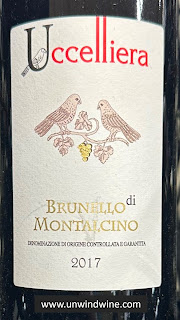Uccelliera Rapace Toscana 2018 - perfect pairing with spaghetti
Sunday night dinner, Linda prepared spaghetti with a delicious bolognese tomato sauce with garden fresh herbs and fresh shaved parmesan cheese, with grilled fresh bread.
I pulled from our cellar this Tuscan Sangiovese blend for a perfect food wine pairing, a perfect example where when an ideal symbiotic pairing is achieved between food and wine, the complement greatly accentuates the enjoyment of both.
This Tuscan Sangiovese blend is from small boutique producer Andrea Cortonesi, the only son of a family of sharecroppers who has been working in the vineyards and in all the related activities of the farm since his childhood, when he started helping his father.
Andrea has been sharpening his skills as a winemaker and entrepreneur since 1986 when he acquired the farm with century-old olive trees, pastures and a small vineyard. Andrea grew up in that culture of a farmer where sacrifice and hard work are rooted in deep respect, love and humility for the land.
Uccelliera is the name of his old homestead laid on the hillslope of
Castelnuovo dell’Abate, a small village in Tuscany, central Italy,
administratively a frazione of the comune of Montalcino, province of
Siena. At the time of the 2001 census its population was 236.
Historic middle age papers report of the existence of this place, called Uccelliera which means aviary, near Sant' Antimo Abbey and the alabaster quarries, attributing the origin of its name to the use of raptors for hunting. The ancient quarries that yielded the alabaster for the Abbey of Sant'Antimo border the vineyard.
The hamlet dates back to the middle ages, when in 1462, as a fortress of the Abbey of
Sant’Antimo, included a residence which subsequently became property of the Bishop of
Montalcino. Since then the estate building was nicknamed “Palazzo del Vescovo” (the Bishop’s Palace).
The small medieval village in Val d’Orcia is located within the municipal borders of Montalcino, close to the Abbey of Sant’Antimo. The village lies in a beautiful hilly area, home to many vineyards that produce the famous wine Brunello di Montalcino.
The direction of the rows, the constant and attentive manual care of the vineyard to maintain a balanced growth and a regular thinning of the bunches contribute to the production of grapes to be perfectly ripe, healthy and fragrant, all essential requirements for a balanced wine, rich in structure, suitable for brief and long ageing.
Uccelliera produces a small portfolio of estate sourced wines with four price-points, a most highly acclaimed DOCG ultra-premium flagship Brunello di Montalcina, and a Riserva, a premium more standard DOC, and two IGT wines.
All the labels shown are currently available at Binny's, our local big box beverage super store. I went back to obtain more of the Rapace and it was sold out.
The extra special Brunello di Montalcino Riserva, a DOCG (Denominazione di origine Controllata e Garantita) is 100% Sangiovese produced in outstanding vintages from the best fruit, of which bottles 9,600 of 750 ml are produced annually in such years.
The appellation Riserva designation is given to the wine produced under exceptional growing conditions with carefully selected grapes from the oldest plantings of the oldest vineyards wine produced with selected sangiovese grapes from Brunello di Montalcino designated vineyards of approximately 17 acres planted in 1975, 1988, 1998 and 2000 in Castelnuovo dell’Abate, south-east of Montalcino at an altitude that varies from from 150 (492 ft) to 350 (1150 ft) meters. The soil is of medium consistency, calcareous-clayey with presence of sands and marl, rich in minerals and skeleton.The second label, Rosso di Montalcino is produced with both selected Sangiovese grapes reclassified from Brunello di Montalcino designated vineyards, and those designated as Rosso di Montalcino. Rosso di Montalcino is a DOC, (Denominazione di Origine Controllata) wine.
It has an annual production of 26,400 bottles of 750, as well as 400 ml of 1500 ml.
Uccelliera Rapace Toscana IGT 2018
It is a Super Tuscan Blend comprised of 70% Sangiovese, 20% Merlot, 10% Cabernet Sauvignon, sourced from a selection of Sangiovese grapes, reclassified from Brunello di Montalcino designated vineyards, and estate grown Merlot and Cabernet Sauvignon.
Annual production is 9500 to 10330 of 750 ml, 500 ml and 1500 ml bottles produced.
The collected grapes are expedited to reach the cellar in as short a time as possible, are subjected during the the destemming process with dry ice to prevent the berries from oxidation and, by cooling down the temperatures, to preserve their original characteristics.
After draining off the skins, malolactic conversion occurs in stainless steel, then, the wine is aged in French oak vessels for at least 12 months followed by a further refinement in bottle for a minimum of 6 months.
This wine was rated 92 points by James Suckling and 90 points by Wine Advocate.Winemaker Notes - Marked tannins but very smooth, soft and structured, well blending with the woods with which it is refined.
As noted above, this was a wonderful accompaniment to the tangy meat and tomato sauce.
Dark garnet colored, medium bodied,, bright expressive black cherry and berry fruits accented by tobacco and oak with hints of cinnamon spice with acidity and smooth polished tannins on a tangy finish.






No comments:
Post a Comment